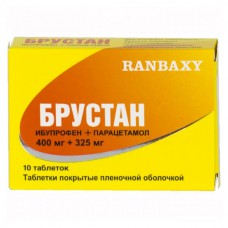Expiration date: 10/2026
International name: Ibuprofen+Paracetamol (Ibuprofen+Paracetamol)
Group affiliation: analgesic non-drug
Description of active substance (INN):
Ibuprofen+Paracetamol
Dosage form:
coated tablets, tablets, soluble [for children]
Indications:
For adults-moderate intensity pain syndrome, traumatic inflammation of the soft tissues and musculoskeletal system (bruises, sprains, fractures, etc.), postoperative period, algodismenorrhea, toothache, neuralgia, myalgia, lumbago, fibrosis, tendovaginitis, headache, feverish syndrome. Joint syndrome (rheumatoid arthritis, osteoarthritis, ankylosing spondylarthritis, gout arthritis). Sinusitis, tonsillitis. For children (as an auxiliary drug): tonsillitis, acute infectious and inflammatory diseases of the upper respiratory tract (pharyngitis, tracheitis, laryngitis).
Contraindications:
Hypersensitivity, gastric ulcer and duodenal ulcer (in the acute phase), hepatic and/or renal failure, diseases of the blood, glucose-6-phosphate dehydrogenase deficiency, "aspirin" asthma, pregnancy, lactation.With caution. Bronchial asthma, bronchospasm, CHF.
Side effect:
Dizziness, visual impairment, dyspepsia, diarrhea, erosive and ulcerative lesions of the gastrointestinal tract, bleeding from the gastrointestinal tract, allergic reactions (skin rash, itching), impaired liver function, nephropathy, thrombocytopenia, swelling.
Dosage and administration:
Inside (before or 2-3 hours after eating). Adults-1 tablet 3-4 times a day.
Special instruction:
With the simultaneous use of anticoagulants indirect action-control of the blood coagulation system.
Interaction:
Long-term combined use with paracetamol increases the risk of nephrotoxic effects. The combination of ethanol, GCS, corticotropin increases the risk of erosive and ulcerative lesions of the gastrointestinal tract. Ibuprofen increases the effects of direct (heparin) and indirect (coumarin derivatives and indandiona) anticoagulants, thrombolytic agents (alteplase, anistreplase, streptokinase, urokinase), antiplatelet agents, colchicine increases the risk of hemorrhagic complications. It enhances the hypoglycemic effect of insulin and oral hypoglycemic drugs. It reduces the effects of antihypertensive drugs and diuretics (by inhibiting the synthesis of renal Pg). Increases blood concentrations of digoxin, Li+ and methotrexate. Caffeine increases the analgesic effect of ibuprofen. Cyclosporine and Au drugs increase nephrotoxicity. Cefamandol, cefoperazone, cefotetan, valproic acid, plicamycin increase the frequency of gipoprotrombinemii.
The description of the drug Brustin is not intended to assign treatment without a doctor.


